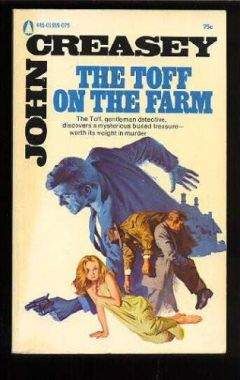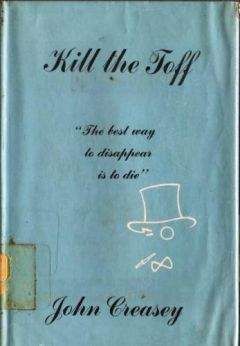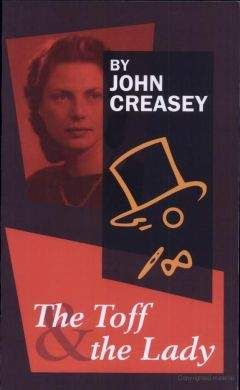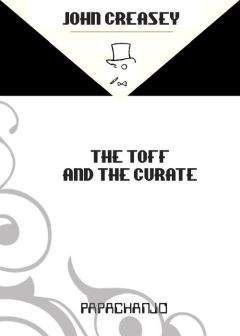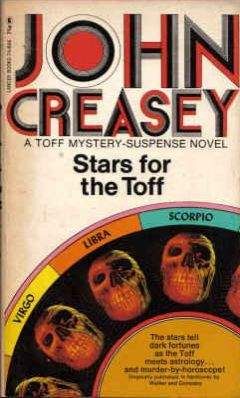John Creasey - The Toff In Town
On a small table between two chairs were liqueur glasses and on an ash-tray near them, several cigarette-ends. Two were plain, two were red-tipped. -So the man—presumably Oliver Merino—and the girl, had sat here. Rollison touched one of the ends, which was quite cold although damp, but another, burned right down after it had been put into the tray, was slightly warm, and there was a faint smell of tobacco smoke.
They had been here not many minutes ago.
“Sorry, Jolly,” said Rollison aloud, and walked across to a fine walnut escritoire, with beautifully carved legs and edges. He pulled at the drawers; every one was locked. He took out the knife again, selected a “blade” which was in fact a skeleton key, and very soon the drawers were open. Each drawer was neat and tidy; in one were account-books, in another, files of letters, in a third, pens, pencils and stationery. He looked through the account-books which told him little except that there were few accounts noted there, but the few were all large ones. They were curiously kept, too. Instead of having the name and address of the “customer”, each page was headed by letters and numerals. A—A-l—A-2 and so on. Some of the totals of the accounts ran into five figures, none was less than four figures.
He glanced through the letters.
All were addressed to Merino—except a few, which began: “Dear Oliver” The signatures were usually full, not just Christian names. Most of the letters came from abroad—there were several from Paris and New York, some were from Johannesburg, two came from Buenos Aires, one from Lahore, another from Rangoon. The Rangoon letter particularly interested Rollison, simply because it came from Burma. It was brief and to the point:
“Dear Mr. Oliver,
The goods have been despatched by air mail and should reach you about the same time as this. I have no further information about the other matter—I do not think you will get further information from here, they have moved to London all right.
Yours sincerely,
Maurice Fenton.”
And in a circle drawn at the corner of the letter was the cipher: B-2.
Rollison looked at the page in the account-book under that heading—and his lips rounded in an “O” of astonishment. It was the largest account he had yet seen, and ran into the three hundred thousands. There were thirteen entries, the lowest a total of £11,350. Here and there a single word, such as “rubies” or “pearls”, suggested that some of the merchandise was jewels.
He replaced the letters and the books and then, with the help of his skeleton key, re-locked the drawers. That done, he looked about the room, wondering where the safe was kept. A wall-safe? Or one let into the floor? Certainly there was no piece of furniture which looked as if it concealed a safe.
He moved the pictures aside, one after the other and when he looked behind the Birket Foster, he found what he sought Here was a wall-safe, an ordinary combination type with a small knob in the middle of the circular piece of shiny steel. He touched the knob gingerly with his finger—and snatched it away as pain shot through his hand. The safe was electrically controlled—and alive. He rubbed his finger and waked until the stinging sensation had gone, then turned away. If Merino thought the safe worth such protection, it probably contained something very valuable—perhaps the explanation of the big figures in the account-books.
He thought much about Blane and his talk of diamonds. He went into the kitchen and searched under the sink and in the larder for the electric meter and main switch; he found none. Nor were they in the hall or in the bath-room. He went into the dining-room and bedroom, and could not find what he wanted. He had seen nothing which might conceal a meter in the drawing-room either, but there must be a meter. It might be somewhere outside. There was no back entrance.
He did not find what he wanted on the narrow landing or anywhere on the stairs.
He returned to Merino’s flat, and as he closed the door, he murmured aloud:
“That’s very odd—eh, Jolly?” He smiled when he thought of Jolly’s reaction to such an impasse as this, then put the thought out of his mind. In the drawing-room, he thought he heard a slight sound and stood still, looking at the windows, seeing garage doors and the drab cobblestones in the roadway. The sound wasn’t repeated, it had probably come from outside. He went to the safe again, then tried to trace the electric wiring from that—it might be connected to the mains hidden in the wall; whoever owned this flat would not like to see the untidy contraptions of meter and fuse box in the open. But the wiring was chased, the channel was plastered and painted over.
Then something crashed behind him, and he swung round.
“Seen enough, mister?” asked a man.
It was Blane, his head and shoulders above a hole in the floor. He had an automatic in his right hand.
CHAPTER EIGHT
TWO-IN-ONE
BLANE did not appear to recognise Rollison; he had only seen him for a little while and then in electric light. The disguise might be good enough to fool him, although he would need all his wits and a modicum of luck to get away from here.
Behind Blane was a piece of flooring, pushed up from a hinge and resting against the wall that had caused the crash. He was obviously standing on some steps which led from Miss Dexter’s, below.
Blane rested his left hand on the floor and came up another step; the gun in his right hand didn’t waver.
“Well, have you?” he demanded.
Rollison spoke in a high-pitched, almost falsetto voice.
“I—I’m waiting for Mr. Merino.”
“You’re waiting for me, although you didn’t know it.” Blane came up another step, but he would have to mount at least two more. When he climbed into the room he would be off his balance.
Rollison stood with his mouth gaping and his hands raised as if in sudden fear.
“Get away from the safe,” ordered Blane, and came another step up. “And don’t try any tricks.”
“Tricks?” squeaked Rollison, moving forward. Between him and Blane was a footstool—a little nearer Blane than it was to him.
“Stand still!” snapped Blane.
“But you said——” began Rollison.
He dived forward, grabbed at the stool held it for a fraction of a second and heaved it as Blane fired; the shot rang out, but the bullet missed. The footstool struck Blane in the stomach, and Rollison managed to spring forward from his knees and hands. As he clutched Blane’s right wrist, another shot hit the ceiling; then the gun dropped.
“You——” gasped Blane.
Rollison hit him powerfully on the side of the jaw, then struck again. Blane’s eyes rolled. He slipped off the ladder and would have fallen, had Rollison not held his arm.
Rollison picked up the gun and brought the butt down on the side of Blane’s head, hard enough to knock him out.
He dragged him out of the hole, and across the room, on the alert lest the shots had been heard.
When he was in the doorway, with Blane at his feet, he paused and listened, but heard only a car starting up in the mews. He turned into the kitchen and opened the first drawer, finding what he wanted—a piece of parcel string. He hurried back, tied Blane’s hands and feet tightly, stuffed his own handkerchief into the man’s mouth, then dragged him into the kitchen and locked the door.
He slipped the key into his pocket and went into the drawing-room, tidying his hair, breathing heavily. Very soon he stood at the bottom of a flight of wooden steps. They led to a small passage, where there was only one door which led into another well-furnished drawing-room. It was not unlike the room upstairs—but smaller, because the little passage was taken out of it. He stepped inside and closed the door. It fitted flush with the wall, and the outline of the door was almost lost in the pattern of the wall-paper—modernist stuff with a series of straight lines and zig-zags. On the walls-were large, framed photographs, in colour, of film stars.
He went to the front door of the flat, shot the bolts, then looked for the electric switch. He found it in the kitchen; this one must serve the two flats; Miss Pauline Dexter and Mr. Oliver Merino were doubtless on the best of terms. He switched off the current, then hurried up the ladder to the larger room.
The knob no longer stung him when he touched it.
He might find the right combination quickly; equally it might take him an hour or much longer. He turned the handle right and left, and could just hear the tumblers falling. He did not try any particular combination for a few minutes, but got the feel of the knob and discovered the best angle for hearing the tumblers.
After ten minutes, he gave it up, and stood close to the wall, looking out of the window, feeling disappointed, and yet aware that he had learned much. Now, he faced unpleasant facts. He could keep turning the knob for hours without hitting on the right combination. He might find tools in the kitchen with which he could get at the safe through the wall, but that would take too long.
Better to search through the girl’s flat and see what he could find there.
The drawing-room held little of interest—except the photographs. Film stars had autographed these pictures, they were not just printed signatures; here the ink had smudged, there a pen had scratched the smooth surface. Some of the most famous English film stars were there, and all had “deared” Pauline or been otherwise affectionate.
The small writing-bureau was unlocked. Inside the top drawer was a memorandum pad and a desk diary. Rollison looked through the diary, and an entry for Saturday caught his eye. It said simply “Aeolian Hall, 3.45 p.m.”
“So she’s going there on Saturday, too,” mused Rollison. “But In Town To-night doesn’t start until six-fifteen.”
He went into the next room, expecting to find a dining-room.
Instead, it was very like a dressing-room back-stage. There was a long, gilt-framed mirror along one wall and a bench beneath it. Grease-paints and make-up material were spread out on the bench, with two bowls of red roses, one in bud, one in full flower. Inside a wardrobe with sliding doors were several costumes, some modern, some old-fashioned. There were wigs, powders, dozens of pairs of shoes and, in one section, hat was piled upon hat. The other two walls were adorned with more photographs of film stars, some famous, some much less well-known; all of them had signed themselves as if they were on intimate terms with Pauline Dexter, of whom Rollison had never heard.
In a waist-high cupboard, made of the same polished walnut as the wardrobe and the bench, were sheaves of papers—film scripts and one or two B.B.C. scripts. There was some correspondence, too, from the Meritor Motion Picture Company. He glanced through it and learned that Pauline Dexter was in the running for a leading part in a film shortly to go on the floor.
He found nothing else of interest, so took another look round the upstairs flat, but added no more to his meagre knowledge of Merino. He looked into the kitchen, where Blane started to struggle as soon as the door was open. So he was all right. Rollison walked quickly past the garage, where the garage-hand was bending over a small car.
He reached Gresham Terrace just after four o’clock, took off the beard and moustache and washed briskly. Then, looking and feeling more himself, he invited Jolly to take tea with him.
Jolly, recognising that as an olive branch, politely accepted.
“Shall I pour out, sir?” he asked.
“Yes,” said Rollison.
“Jolly, I’ve had a full afternoon and done a great number of things that I shouldn’t have done, and I also arranged for Perky Lowe to follow a cream Chrysler about London. Ask him to call back if he comes while I’m out, but get his story.”
“Very good, sir.”
“And we now know that a Mr. Merino, a cream-coloured Chrysler and a film starlet named Pauline Dexter—do you know Pauline Dexter?—are concerned. Have you ever heard of a Mr. Merino?” Rollison added.
Jolly considered.
“I only know the name in connection with wool, sir.”
“Wool?”
“Used, I believe, in the manufacture of underwear,” remarked Jolly. “A sandwich, sir?”
Thanks. I seriously doubt if there’s any connection between my Merino and underwear. Did you do all those jobs I asked about this morning?”
“Yes, sir.”
“Get any good prints from the knife?”
“Very good ones, sir, and the photographs will be ready some time this evening.”
“Wonderful! As a reward, here’s another job. Get hold of Miss Caroline Lawley’s maid—do you know her?”
“Slightly, sir,” confessed Jolly.
“And find out from her if she’s ever heard of a man named Merino in the motion-picture business. He’s a handsome beggar with a swashbuckling air and a black beard which matches his hair and eyebrows, but all might be false. He wears clothes of American cut and likes Stetsons. Also—quite casually if you can—find out what you can about Pauline Dexter, who seems to be under contract to the Meritor Motion Picture Company. Miss Lawley’s maid is almost certain to know a little bit about Pauline, even if the man Merino is unknown in the film world. Any news from Snub?” he added.
“A telegram, sir, saying that he hoped to be here by seven o’clock,” Jolly said.
“The Aliens?”
“I telephoned twice this morning and once this afternoon, and understand that Mr. Allen is in bed and that Mrs. Allen hasn’t been out to-day. Sam Willis also telephoned, to say that nothing had happened—he seemed a little disappointed, sir.”
“That shouldn’t surprise you,” said Rollison. He finished his tea. “I must be at the Aeolian Hall at five o’clock,” he added. “When Mr. Wardle and I have finished a grand tour, I should know more about In Town To-night than I do now, and perhaps more about the mystery.”
“And what time will you be back, sir?” asked Jolly.
“I don’t know, but I’ll dine out.”
He broke off, as the front door bell rang.
Jolly got up and went out. Rollison filled his cigarette case from a box on the desk, and listened to the conversation after Jolly had opened the door.
“Is this the home of Mr. Rollison?” asked a man with a deep voice.
“Yes, sir.”
“And is Mr. Rollison in?”
“I’m not quite sure, sir,” said Jolly. Were he not sure that Rollison should see this man, he would have answered with an emphatic “no”, because he knew how eager Rollison was to leave for the B.B.C. “If you will please come in, I will find out.”
“Thank you.” The man’s voice held a hint of laughter.
“Your name, sir, please?”
“Just say a friend,” said the owner of the deep voice. Jolly did not press the point but came towards the study. Rollison, already sure who the visitor was, saw him as Jolly pushed the door wider open. It was Mr. Merino.
CHAPTER NINE
MERINO
“Yes, Jolly,” said Rollison, “I can spare a few minutes.
